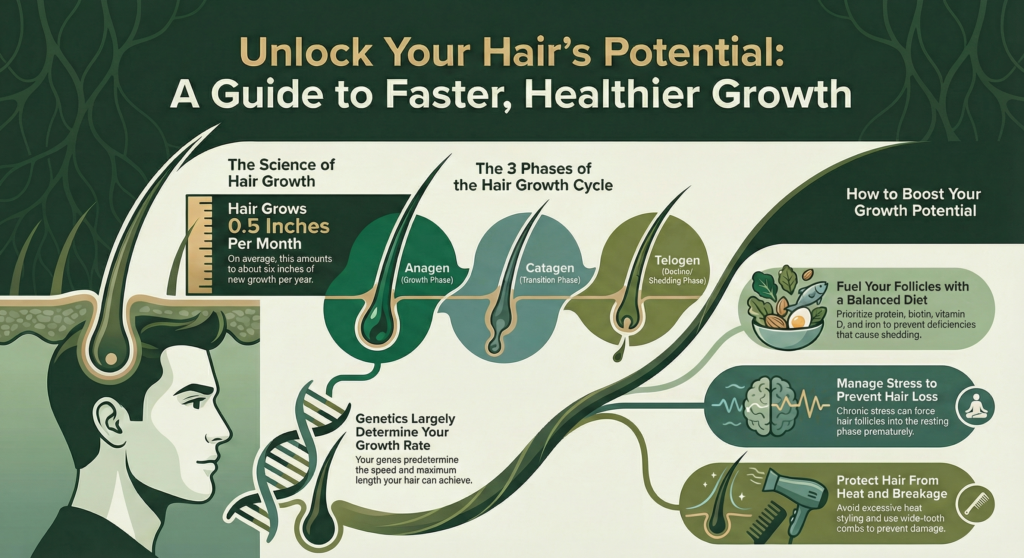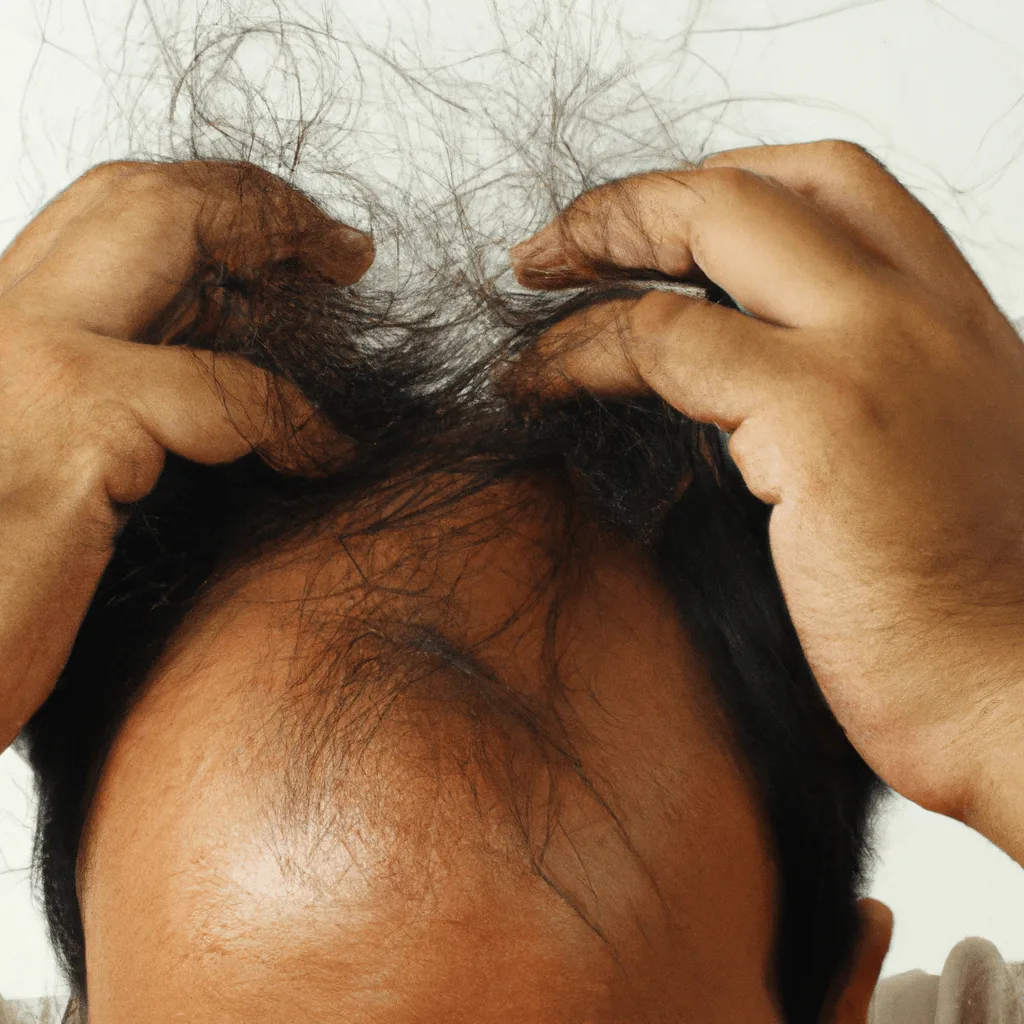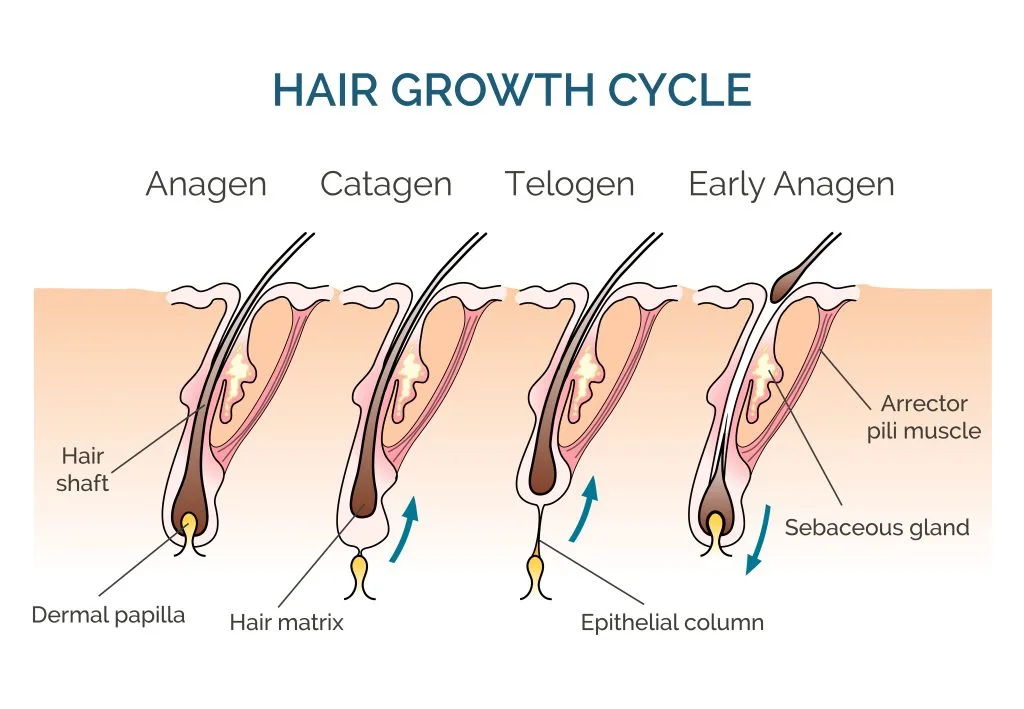How Fast Does Hair Grow? (and How To Make It Grow Faster)


Understanding how to achieve faster hair growth and the various factors that contribute to hair growth rate is essential for anyone looking to achieve longer, healthier hair. Hair growth is influenced by a myriad of factors, including diet, stress levels, genetics, and more. This comprehensive guide delves into these various elements to help you understand and improve your hair growth rate.
Key Takeaways
- On average, hair grows about half an inch (approximately 0.01 inch per day) each month, but this rate varies depending on genetics, age, hair type, and environmental factors.
- The hair growth cycle consists of three phases: anagen (growth phase), catagen (transition phase), and telogen (resting phase), which collectively influence overall hair health and growth rate.
- A well-balanced diet rich in essential nutrients like biotin, vitamin D, iron, and enough protein is crucial to promote healthy hair growth and prevent nutritional deficiencies that can cause hair shedding.
- Stress and hormonal changes can shift hair follicles into the resting (telogen) phase prematurely, leading to increased hair loss and slower hair growth.
- Regular scalp care, including cleansing to remove product buildup, scalp massages, and using conditioners and topical solutions, supports healthy hair roots and stronger hair strands.
- Avoiding excessive heat tools and protecting hair with heat protectants can prevent hair breaks easily and damage to the hair shaft.
- While genetics largely determine hair growth rate and length, adopting healthy hair care practices and managing lifestyle factors can optimize your hair growth potential.

What factors affect hair growth and how fast your hair grows?
How does diet impact hair growth rate?
Your diet plays a critical role in how fast your hair grows. Consuming a balanced diet rich in vitamins, minerals, and proteins is essential for healthy hair growth. Nutrients like biotin, vitamin E, iron, and omega-3 fatty acids bolster the strength and vitality of each hair follicle, thus impacting the speed of hair growth. Deficiencies in these essential nutrients can result in slow hair growth and even hair shedding. Therefore, maintaining a nutrient-rich diet is one of the best hair growth tips you can follow to keep your hair healthy.
Can stress affect hair growth?
Indeed, stress is one of the many factors that can significantly affect hair growth rate. When you are stressed, the body goes into survival mode, prioritizing essential bodily functions over hair growth. Chronic stress can lead to conditions like telogen effluvium, where more hair follicles enter the telogen phase earlier than normal, resulting in increased hair shedding and slower hair growth. Learning stress management techniques can therefore promote healthy hair growth by keeping more hair follicles in the growth phase.

Are genetics a factor in how fast your hair grows?
Genetics greatly influence the rate at which hair grows. Genetic factors determine the growth rate of human hair, affecting how quickly and long it can grow. The hair growth cycle, including the anagen and telogen phases, is genetically predetermined, dictating how long and fast your hair grows. As people age, their hair follicles begin producing thinner hair at a slower pace. While you can’t change your genetics, understanding that they play a vital role in hair growth can help you set realistic expectations and focus on factors within your control, such as diet and stress management.
How much does hair grow in a month?
What is the average hair growth rate per month?
The average hair growth rate per month is generally about half an inch, which translates to approximately 0.01 inch per day. People with round follicles have straight hair, which can influence their hair growth rate. However, this can vary based on several factors, including age, health, and genetic makeup. It’s worth noting that different types of hair tend to grow at different rates, so individual experiences may vary.
How can you measure your hair growth?
Measuring your hair growth involves simple steps to track progress accurately. You can use a ruler or tape measure to note the length of a specific section of hair at the beginning of a month and compare it at the end. For more precision, consider marking the hair shaft to identify exact growth. Regularly measuring your hair growth rate can also help you determine if particular treatments or lifestyle changes affect hair growth positively.
Are there any techniques to make hair grow faster within a month?
To make hair grow faster within a month, consider incorporating practices like scalp massages, which enhance blood circulation and promote hair growth. Scalp massages can lead to thicker hair by dilating blood vessels beneath the skin, which may help prevent breakage and damage to the hair. Using shampoos and products specifically designed to speed up hair growth can also make a difference. Additionally, avoiding heat-styling tools and chemical treatments can prevent hair breakage and foster a healthier environment for hair to grow.

How long does hair grow in a year?
What is the typical yearly hair growth rate?
Over the course of a year, hair typically grows about six inches. This annual growth rate may be influenced by seasonal variations, individual health, and other external factors. For optimal yearly hair growth, frequent trimming to get rid of split ends and maintaining a healthy scalp and hair care regimen are recommended.
Are there seasonal variations in hair growth throughout the year?
Yes, there are seasonal variations in hair growth. Studies suggest that hair tends to grow faster during the summer months compared to winter. The increase in sunlight exposure during summer stimulates hair follicles to produce more hair, while reduced exposure in winter can slow down the rate of hair growth. Additionally, males may find that their hair grows faster than that of females, which could also influence individual growth patterns.
How can you maintain healthy hair growth over a year?
Maintaining healthy hair growth over a year involves a combination of proper hair care practices and a balanced lifestyle. Regularly trimming your hair to remove split ends, avoiding excessive heat and chemical treatments, and ensuring your diet includes nutrients essential for healthy hair are all crucial. Additionally, regular scalp massages to stimulate blood flow and using conditioners and shampoos enriched with growth-promoting ingredients can help maintain healthy hair growth.
What are the phases of the hair growth cycle?

What happens during the anagen phase?
The anagen phase is the growth phase in the hair growth cycle, lasting between two to seven years. Most hair growth occurs during this phase, as hair cells in the root divide rapidly, leading to continued hair growth. The length of this phase varies among individuals and determines how long hair can grow. A longer anagen phase results in longer hair, making this phase crucial for people looking to grow hair faster and achieve greater hair length.
What is the telogen phase and its impact on hair shedding?
The telogen phase is the resting phase in the hair growth cycle, lasting about three months. During this phase, hair follicles stop producing new hair, and the hair roots rest. This phase ultimately ends in hair shedding, making way for new hair growth to begin. An extended telogen phase can result in more significant hair shedding, affecting overall hair density.
How does the hair growth cycle affect overall hair health?
The hair growth cycle, comprising the anagen, catagen, and telogen phases, is crucial in maintaining overall hair health. Understanding this cycle helps identify factors leading to hair thinning, breakage, or loss. Maintaining a balance between these phases ensures that the hair remains healthy, dense, and resilient over time.
How can you promote healthy hair growth and prevent hair loss?
What are the best practices for a healthy scalp?
A healthy scalp is essential for promoting hair growth and preventing hair loss. Regularly cleansing with a gentle shampoo ensures that your scalp remains free from build-up and clogged follicles. Scalp massages stimulate blood circulation, encouraging nutrient absorption into the hair roots. Additionally, keeping your scalp moisturized can prevent flaky, dry skin, which could impede hair growth.
How does biotin contribute to hair thickness and growth?
Biotin, also known as vitamin B7, is essential for healthy hair. It enhances the production of keratin, a key protein in the hair shaft, contributing to hair thickness and strength. Incorporating biotin-rich foods or supplements can significantly improve hair growth and overall hair health, making it a vital nutrient for those looking to improve hair quality.
Can specific shampoos help in promoting hair growth?
Yes, specific shampoos formulated with ingredients like biotin, keratin, and essential oils can promote hair growth. These shampoos provide nourishing substances that reinforce hair follicles, reduce breakage, and help grow hair faster. Using these specialized shampoos regularly can help maintain a healthy scalp and encourage robust hair growth.
Tips for preventing hair breakage and thinning
Preventing hair breakage and thinning requires adopting several good practices. Avoiding excessive use of heat-styling tools and chemical treatments helps reduce brittleness. Additionally, using a wide-tooth comb to detangle wet hair minimizes the risk of breakage. Incorporating a balanced diet rich in essential nutrients can also strengthen hair from the inside out, while regular trims help remove damaged ends, contributing to a healthier, fuller mane.
Looking to the future of your hair growth
Understanding how hair grows and the factors that influence its growth can empower you to take control of your hair health. A balanced diet, stress management, and knowing your genetic predispositions play crucial roles in achieving optimal hair growth. While the average growth rate is about half an inch per month, individual results may vary. Incorporating healthy hair practices, like scalp massages and avoiding damaging treatments, can enhance growth. By maintaining a nutritious diet and proper hair care regimen, you can promote healthier, stronger hair over time.

You might like these!



